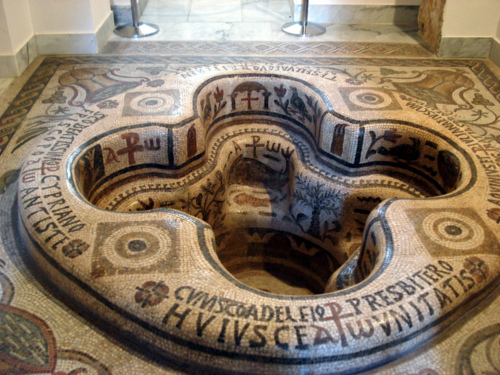First Reading: Jeremiah 33:14-16
Responsorial Psalm: Psalm 25:4-5, 8-9, 10, 14
Second Reading: 1 Thessalonians 3:12–4:2
The readings for the First Sunday of Advent, like the readings throughout Advent, are truly forward looking. This, of course, fits with the emphases of the liturgical season, which exists to turn our hearts and minds toward Christmas, when we celebrate the Mystery of the Incarnation anew.
I am struck, however, by the future tense in this Sunday’s readings.
The first reading, from Jeremiah, describes what will happen in those days when God says, “I will fulfill the promise I made to the house of Israel and Judah.” Naturally, Christians approach the season of Advent with the conviction that those days have indeed been fulfilled, for the birth of Christ, which we anticipate commemorating on December 25, represents a fulfillment of God’s promises to Israel (Luke 24:25-28).
We must not, however, read Jeremiah’s future vision as though it were a dead prophecy now. While Catholics certainly claim that Jesus is the fulfillment of God’s work and revelation (Dei Verbum, no. 2), we also continue to hold out hope for God’s complete transformation of the world when Christ the King—whose feast we just celebrated last weekend—returns, in the words of this week’s Gospel, “in a cloud with power and great glory.”
This, ultimately, is the twofold reminder of Advent. As the USCCB explains, the season is “a time of preparation that directs our hearts and minds to Christ’s second coming at the end of time and to the anniversary of Our Lord’s Birth on Christmas.”
In practice, I fear we all too often orient our Advent preparations only to one of these two ends, focusing so much on what we are doing for Christmas that we lose sight of the larger spiritual preparation that is supposed to be at work as well.
The future orientation of the readings for this First Sunday of Advent help us expand our notion of what it means to prepare. Jeremiah’s assurances that “in those days Judah shall be safe and Jerusalem shall dwell secure” provides a hopeful vision for what the world would be like if we truly lived in the already of the Kingdom without the accompanying not yet. The tragic events of last weekend in Waukesha, WI, just miles from where I live (not to mention the pain from more than a year ago dredged up in nearby Kenosha, WI last week) remind me how far we remain from Jeremiah’s vision and underscore the value of hoping against hope (Romans 4:18) for a different world altogether.
The other readings, meanwhile, speak to how we might chart a path toward that more optimistic future.
In the Gospel, Jesus encourages his followers to “Beware that your hearts do not become drowsy” not just “from carousing and drunkenness” but also from “the anxieties of daily life.” The latter concern is a particularly acute risk in a context where busyness is essentially the air we breathe. If we do not use the gift of Advent for a little introspection, we will likely miss the ways we are called to conversion, not just for Christmas Day, but for our whole lives.
St. Paul’s letter to the Thessalonians—the one reading cast in the present tense—speaks even more directly to the steps we can take now to ensure that we do not let the anxieties of daily life consume us. Reminding his audience to conduct themselves in accord with the “instructions we gave you through the Lord,” St. Paul prays for us all when he says, “May the Lord make you increase and abound in love for one another.”
In this season of Advent, the call to preparation is strong, and the means to answer it are simple (although not easy). We simply need to take the time to turn our focus away from the anxieties of daily life and toward an active love for one another and for all.
We can certainly do that through acts of charity—like donating to the food drives that will go on around us this month, or volunteering—but we should also remember the spiritual works of mercy that are part of our tradition too. In a world riven by the divisions of polarized politics and polarized churches, praying for the living—especially those with whom we would disagree—and the dead might be the most revolutionary act we can undertake in preparation for the Second Coming of the Son of Man “in a cloud with power and great glory.”
Let us heed the call and prepare ourselves, so that we can say with renewed vigor and purity of intent our perennial Advent refrain, “O Come, O Come, Emmanuel.”





